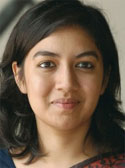
By Tahmima Anam
August 30, 2016
At what point would I rather die?
It has been about two months since the terrorist attack at the Holey Artisan Bakery that led to the deaths of 20 people in my hometown, Dhaka, Bangladesh. By all accounts, the city — at least the part of the city where the attack took place and where I have lived for the last two decades— is irrevocably changed. There are checkpoints all over the neighbourhood; many restaurants and cafes have been shut down; foreigners are sending their families home and schools are yet to reopen. In the evening, the streets are quiet and sad.
But there is an abundance of talk. Everyone is still talking about the incident, playing it over and over in conversation, airing the accounts that have emerged from that night. One story in particular has transfixed everyone: According to some reports, there were two types of victims — the foreigners who were killed immediately by the terrorists and the Bangladeshis who were murdered later when they refused to acquiesce to the demands of their captors.
There was Faraaz Ayaaz Hossain, who was offered release but wouldn’t leave his non-Bangladeshi friend to her fate; his body, it is said, was the most mutilated of the victims, full of defensive wounds he is presumed to have suffered as he tried to protect her. There was Ishrat Akhond, a beloved member of the art community in Dhaka, who had taken two Italian colleagues out for dinner; she was killed, according to reports, because she refused to wear a Hijab and recite verses from the Quran.
Some of this is conjecture and unverifiable rumour, but when my friends and I discuss what happened that night, we always ask the “what would you do?” question. Without fail, everyone I speak to confesses, with some shame, that they would not have been so brave. I would have left my friends and lived, says one. I would have put on that Hijab, says another. I would have recited those verses from the Quran, says a third.
“Better learn your Suras,” my sister writes to me, referring to the chapters of the Quran. “You never know when you might need them.”
When I was growing up, my parents did not hire a Quranic tutor for me. We lived then in Thailand, and among the small Bangladeshi community of Bangkok, there was a woman who went from household to household every Sunday and taught the children of expatriates how to recite the Suras. It was part of every child’s education; she did the rounds, like the Tagore music teacher and the Bangla language teacher. I had the latter two, who darkened my Sundays as they did for all the other children. But not the Quranic teacher; I was spared that third lesson because my father had been a Marxist as a young man and retained an abiding suspicion of religious education.
By the time my sister was born, my father’s stance had softened, and my mother — always the more religious one — had her way. We had returned to Bangladesh by then, and every Friday, my sister had a visit from a Quranic tutor, or Ustani, as she was known. To this day, my sister knows the verses far better than I do.
“I’m telling everyone to memorize a few verses,” one of my friends says.
I confess to not knowing very many.
“Not even the Kalma?”
Well, yes, the Kalma, everyone knows that.
“Learn a few more,” she suggests.
I am tempted. When I imagine myself in that bakery, the cylinder of a gun pointed toward me, I want to know those verses so that I can get out alive. I want to teach them to my son so that he can convince anyone that he, too, is a Muslim.
Of course, I want never to be asked this question, but it is too late for that. Our imaginations are forced to go into ever darker places because, in these times, we know friends who have died and our city is under siege.
What next, I ask myself. Would I wear that Hijab, or would I, as Ishrat reportedly did, refuse to be shrouded? I would wear it, I decide. I would put it on and I would allow the world to close around me, but I would walk out of that cafe alive.
What if it wasn’t just a matter of a moment? What if I had to wear that Hijab every day, every time I stepped out of my house — would I agree to that? How many days would it take before I said I would rather die? A week, two? A year?
And what of those verses — if those Quranic verses were the only thing I was allowed to recite, that book the only book I was allowed to read? What if all verses except the ones in that book were forbidden? What if Shakespeare, Rumi and Tagore were no longer allowed to be part of my life?
The Quran is a part of my identity. I would do well to learn its verses. They might teach me something. They might bring me consolation in a moment of grief; they might, with their hypnotic, circular poetry, tell me something about the mystery of being alive. As a novelist, I can only be glad for an opportunity to learn a verse.
But that isn’t why I would be learning them. I would be learning them out of paranoia, an invisible shield meant to protect me. And if I do that, then those five young zealots who killed those hostages would triumph in a way they could never have imagined.
Tahmima Anam is the author, most recently, of the novel “The Bones of Grace” and a contributing opinion writer.
Source: nytimes.com/2016/08/31/opinion/is-there-safety-in-piety.html?_r=0




 Moderate Islamist here
Moderate Islamist here


0 comments:
Post a Comment